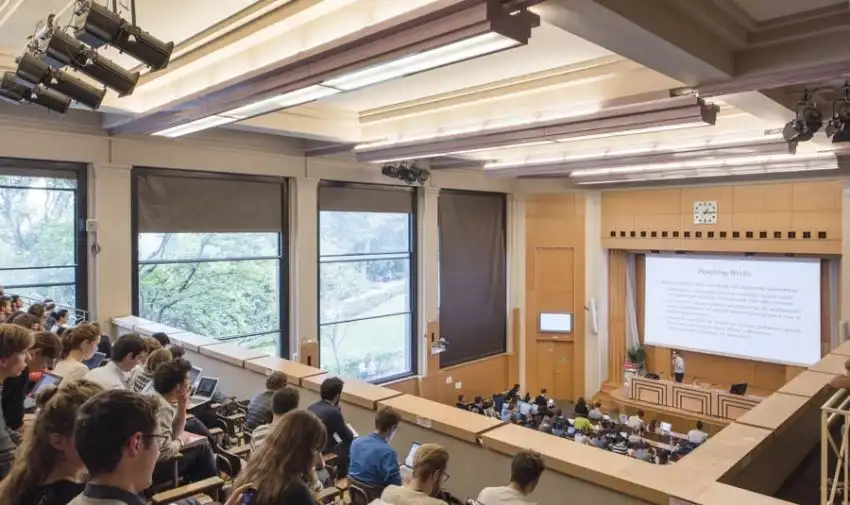Home>The methodology tutorial
16.10.2017
The methodology tutorial
As a symbol of the pedagogy of Sciences Po and guarantee of the success of the institution, the methodology tutorial is now part of the legend and is a genuine place of memory for the students.
From Germany and elsewhere
Founded in 1872, in the midst of the “German crisis of the French thinking”, the École Libre des Sciences Politiques intended to innovate to train new elites and to fill the French academic gap. While its intellectual curriculum is revolutionary through its purpose (the “politics”), its chronological positioning (the “contemporary”) and its geographical scope (“European, or even universal”), its pedagogical ambition is nonetheless innovative and distinctive. Émile Boutmy intends to deliver to the “politician” the same professional training provided “to the physician, to the lawyer, to the engineer, to the military”. The spectre of the German university, with its experimental laboratories, its interactive research seminars and its Privat-Docents, looms over the cradle of the methodology tutorial, along with the English tutorial, well-known by the Anglophile founding fathers of the “École Libre”.
Not one, but a number of tutorials
Belatedly designated under its current name, and quite evasively defined at the beginning (1872), the famous methodology tutorial first came in a wide range of versions: “review and test tutorials”, complementing the lecture, “application tutorials” and “preparation tutorials to examinations”, with a more professional purpose, “working groups” oriented towards research. All these formats have in common the fact of “complementing” the lecture, this “teaching by monologue”, by gathering small, interactive working groups; they also share the fact to call upon “more special men, I would almost say craftsmen, engaged in the various careers and having an excellent grasp of them”.
The virtues of the tutorials have been theorized by Émile Boutmy in various occasions. The first one is connected with methodological positivism and is an ideological safeguard: the tutorial provides “a counterweight always in action which prevents the lecture from giving in to reckless doctrines which would prevail without it; an almost immediate verification refutes, without effort, thoughtless theses”. The second merit of the tutorial is to offer “genuine professional teachings”, by proposing “practical experiences aimed at better preparing our students to the role they will have to play in the various careers they will engage in”. The third benefit is specifically pedagogical, as the tutorial is a “way of redressing methodological errors committed by the student, by demonstrating that often, he does not know while he thought he did, and by convincing him that learning is not enough and that one has to understand, and therefore to think”; the tutorial is also a tool to “cultivate certain abilities an ex cathedra teaching leaves idle”, such as “the access to sources” and to “contemporary documents”, as well as a laboratory to train the student to various exercises: “oral presentations, […] written compositions”, press reviews, newspaper article writing. In addition, tutorials bring in contact young students and young teachers, gathered around a “work in common” which fosters acquaintances and networking.
A paradoxical fate
Paradoxically, this pedagogical innovation, which became the distinctive mark of Sciences Po, was not immediately successful. Émile Boutmy restlessly advocated, before an Executive Board and a Development Board both skeptical, for the value and the number of methodology tutorials (and of applied exercises) within the curriculum and evaluation procedures. He fought to make them compulsory, weekly, numerous and finally graduating. While the creation of tutorials is almost coincident with the first courses delivered by the École in 1872, their designation under the name of “methodology tutorials” occurred only with the major pedagogical reform of 1940-41. After they became a classic of the Sciences Po curriculum, their existence has never been questioned with the development of new pedagogical formats (practical exercises and teaching groups in the 1970s, seminar-courses and workshops in the 1990s-2000s). Since 1872, the methodology tutorial proved its worth !
Marie SCOT, Center for history, Sciences Po.
References :
- Archives de Sciences Po, 1SP : fonds de l’École libre des sciences politiques.
- Sébastien Laurent, L’école libre des sciences politiques, 1871-1914, DEA dissertation of the Paris Institute of Political Studies, under the supervision of Guy Thuillier, 1991.
